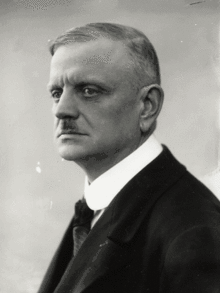Jäger March
The "Jäger March" (Finnish: "Jääkärimarssi", originally "Jääkärien marssi"), Op. 91a, is a military march by Jean Sibelius. He set in 1917 words written by the Finnish Jäger, Hilfsgruppenführer Heikki Nurmio who served in Libau, in the Royal Prussian 27th Jäger Battalion of the Imperial German Army.[1] This unit was fighting against the Russian Empire, of which the Grand Duchy of Finland still was a part. The words were smuggled into Finland to Sibelius, who composed the song in Järvenpää.
| "Jäger March" | |
|---|---|
| Military march by Jean Sibelius | |
 Sibelius in 1918 | |
| Native name | "Jääkärimarssi" |
| Opus | 91a |
| Written | 1917 |
| Text | Heikki Nurmio |
| Language | Finnish |
| Performed | 19 January 1918: Helsinki |
| Scoring |
|
Sibelius wrote the "Jäger March" originally for men's chorus and piano, and later arranged it for men's chorus and symphony orchestra.[2][3] The first public performance of Jäger March was in Helsinki on 19 January 1918 by the choir Akademiska sångföreningen, led by Olof Wallin. The Finnish Civil War began on the same day between the White and the Red troops. The march is the honorary march of many army detachments[4] such as the Lapland Military Band from Rovaniemi.[5]
Lyrics
| Finnish translation[6] | Literal English translation[7] | |
|---|---|---|
| First stanza | ||
Syvä iskumme on, viha voittamaton, |
Deep is our blow, our wrath is invincible, | |
| Second stanza | ||
Kun painuvi päät muun kansan, maan, |
When the rest of the people and the land hung their heads | |
| Third stanza | ||
Häme, Karjala, Vienan rannat ja maa, |
Over Tavastia, Karelia, the strand of Dvina, and the land, | |
References
- "The war and the fifth symphony 1915-1919". Jean Sibelius. Finnish Club of Helsinki. Retrieved 1 December 2015.
- "Works for choir and orchestra". Jean Sibelius. Finnish Club of Helsinki. Retrieved 1 December 2015.
- Barnett, Andrew (2007). Sibelius. Yale University Press. p. 276. ISBN 978-0300111590.
- "Jägers". mannerheim.fi. Retrieved 1 December 2015.
- "The Lapland Military Band - Sotilasmusiikki Sotilasmusiikki". sotilasmusiikki.fi.
- "Jääkärimarssi Lyrics". www.justsomelyrics.com.
- "Jean Sibelius - Jääkärimarssi lyrics + English translation". lyricstranslate.com.
External links
- 2 Marches, Op.91: Scores at the International Music Score Library Project
- Jääkärimarssi Lyrics
- Jääkärien marssi (sound clip, 28 seconds, 488 kB, MP3) presented by Pohjanmaan Sotilassoittokunta (Pohjanmaa Military Band) in the military music homepage of Finnish Defence Forces
- Pushkin Quintett: The Jäger March — new version (YouTube)
- Jäger March on Youtube (Instrumental)
- Jäger March on Youtube (With vocals)